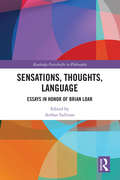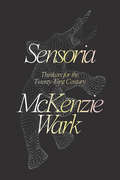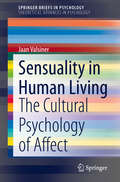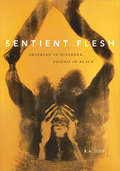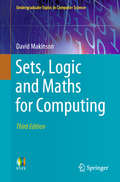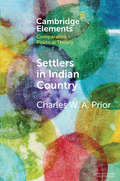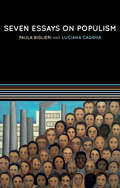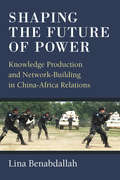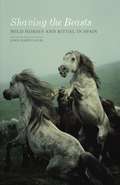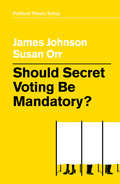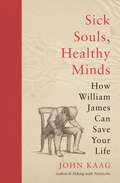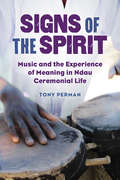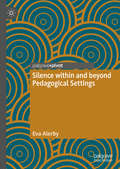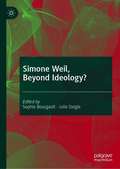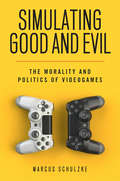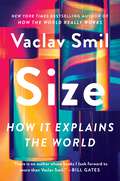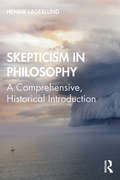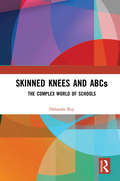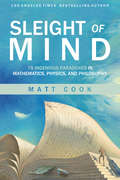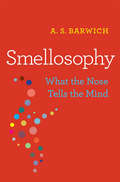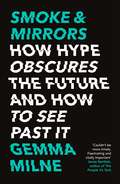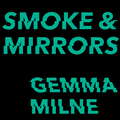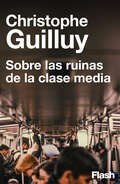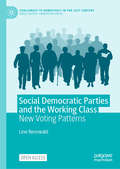- Table View
- List View
Sensations, Thoughts, Language: Essays in Honour of Brian Loar (Routledge Festschrifts in Philosophy)
by Arthur SullivanBrian Loar (1939-2014) was an eminent and highly respected philosopher of mind and language. He was at the forefront of several different field-defining debates between the 1970s and the 2000s—from his earliest work on reducing semantics to psychology, through debates about reference, functionalism, externalism, and the nature of intentionality, to his most enduringly influential work on the explanatory gap between consciousness and neurons. Loar is widely credited with having developed the most comprehensive functionalist account of certain aspects of the mind, and his ‘phenomenal content strategy’ is arguably one of the most significant developments on the ancient mind/body problem. This volume of essays honours the entirety of Loar’s wide-ranging philosophical career. It features sixteen original essays from influential figures in the fields of philosophy of language and philosophy of mind, including those who worked with and were taught by Loar. The essays are divided into three thematic sections covering Loar’s work in philosophy of language, especially the relations between semantics and psychology (1970s-80s), on content in the philosophy of mind (1980s-90s), and on the metaphysics of intentionality and consciousness (1990s and beyond). Taken together, this book is a fitting tribute to one of the leading minds of the latter-20th century, and a timely reflection on Loar’s enduring influence on the philosophy of mind and language.
Sensoria: Thinkers for the Twentieth-First Century
by McKenzie WarkDesign, Politics, the Environment: a survey of the key thinkers and ideas that are rebuilding the world in the shadow of the anthropoceneAs we face the compounded crises of late capitalism, environmental catastrophe and technological transformation, who are the thinkers and the ideas who will allow us to understand the world we live in? McKenzie Wark surveys three areas at the cutting edge of current critical thinking: design, environment, technology and introduces us to the thinking of nineteen major writers. Each chapter is a concise account of an individual thinker, providing useful context and connections to the work of the others.The authors include: Sianne Ngai, Kodwo Eshun, Lisa Nakamura, Hito Steyerl, Yves Citton, Randy Martin, Jackie Wang, Anna Lowenhaupt Tsing, Achille Mbembe, Deborah Danowich and Eduardo Viveiros de Castro, Eyal Weizman, Cory Doctorow, Benjamin Bratton, Tiziana Terranova, Keller Easterling, Jussi Parikka.Wark argues that we are too often told that expertise is obtained by specialisation. Sensoria connects the themes and arguments across intellectual silos. They explore the edges of disciplines to show how we might know the world: through the study of culture, the different notions of how we create such things, and the impact that the machines that we devise have had upon us. The book is a vital and timely introduction to the future both as a warning but also as a road map on how we might find our way out of the current crisis.
Sensuality in Human Living: The Cultural Psychology of Affect (SpringerBriefs in Psychology)
by Jaan ValsinerThis book is a theoretical account for general psychology of how human beings meaningfully relate with their bodies-- from the basic physiological processes upwards to the highest psychological functions of religiosity, ethical reasoning, and devotional practices. It unites art and science into a new theory of affective synthesis that human minds are constantly involved in their everyday life worlds. Provides a new theory of aesthetic synthesis;Demonstrates the links between art and science;Provides a new understanding of the role of affect in human cognition.
Sentient Flesh: Thinking in Disorder, Poiesis in Black (Black Outdoors: Innovations in the Poetics of Study)
by R. A. JudyIn Sentient Flesh R. A. Judy takes up freedman Tom Windham’s 1937 remark “we should have our liberty 'cause . . . us is human flesh" as a point of departure for an extended meditation on questions of the human, epistemology, and the historical ways in which the black being is understood. Drawing on numerous fields, from literary theory and musicology, to political theory and phenomenology, as well as Greek and Arabic philosophy, Judy engages literary texts and performative practices such as music and dance that express knowledge and conceptions of humanity appositional to those grounding modern racialized capitalism. Operating as critiques of Western humanism, these practices and modes of being-in-the-world—which he theorizes as “thinking in disorder,” or “poiēsis in black”—foreground the irreducible concomitance of flesh, thinking, and personhood. As Judy demonstrates, recognizing this concomitance is central to finding a way past the destructive force of ontology that still holds us in thrall. Erudite and capacious, Sentient Flesh offers a major intervention in the black study of life.
Sets, Logic and Maths for Computing (Undergraduate Topics in Computer Science)
by David MakinsonThis easy-to-understand textbook introduces the mathematical language and problem-solving tools essential to anyone wishing to enter the world of computer and information sciences. Specifically designed for the student who is intimidated by mathematics, the book offers a concise treatment in an engaging style.The thoroughly revised third edition features a new chapter on relevance-sensitivity in logical reasoning and many additional explanations on points that students find puzzling, including the rationale for various shorthand ways of speaking and ‘abuses of language’ that are convenient but can give rise to misunderstandings. Solutions are now also provided for all exercises.Topics and features: presents an intuitive approach, emphasizing how finite mathematics supplies a valuable language for thinking about computation; discusses sets and the mathematical objects built with them, such as relations and functions, as well as recursion and induction; introduces core topics of mathematics, including combinatorics and finite probability, along with the structures known as trees; examines propositional and quantificational logic, how to build complex proofs from simple ones, and how to ensure relevance in logic; addresses questions that students find puzzling but may have difficulty articulating, through entertaining conversations between Alice and the Mad Hatter; provides an extensive set of solved exercises throughout the text.This clearly-written textbook offers invaluable guidance to students beginning an undergraduate degree in computer science. The coverage is also suitable for courses on formal methods offered to those studying mathematics, philosophy, linguistics, economics, and political science. Assuming only minimal mathematical background, it is ideal for both the classroom and independent study.
Settlers in Indian Country: Sovereignty and Indigenous Power in Early America (Elements in Comparative Political Theory)
by Charles W. PriorThe aim of this Element is to foreground Native American conceptions of sovereignty and power in order to refine the place of settler colonialism in American colonial and early republican history. It argues that Indigenous concepts of sovereignty were rooted in complex metaphorical language, in historical understandings of alliance, and in mobility in a landscape of layered interconnections of power. Where some versions of the interpretive paradigm of settler colonialism emphasise the violent 'elimination of the native', this work reveals that diplomatic transactions between the Iroquois Confederacy and British colonial and imperial agents reveal a hybrid language of alliance, sovereignty and territory. These languages and concepts of inter-cultural diplomacy provide contexts that suggest a more nuanced and dynamic relationship between colonialism and Indigenous power.
Seven Essays on Populism: For a Renewed Theoretical Perspective (Critical South)
by Paula Biglieri Luciana CadahiaThis important intervention interrogates keystone features of the dominant European theoretical landscape in the field of populism studies, advancing existing debates and introducing new avenues of thought, in conjunction with insights from the contemporary Latin American political experience and perspectives. In each essay – the title a nod to the influential socialist thinker José Carlos Mariátegui, from whom the authors draw inspiration – leading Argentine scholars Paula Biglieri and Luciana Cadahia pair key dimensions of populism with diverse themes such as modern-day feminism, militancy, and neoliberalism, in order to stimulate discussion surrounding the constitutive nature, goals, and potential of populist social movements. Biglieri and Cadahia are unafraid to court provocation in their frank assessment of populism as a force which could bring about essential emancipatory social change to confront emerging right-wing trends in policy and leadership. At the same time, this fresh interpretation of a much-maligned political articulation is balanced by their denunciation of right-aligned populisms and their failure to bring to bear a sustainable alternative to contemporary neo-authoritarian forms of neoliberalism. In their place, they articulate a populism which offers a viable means of mobilizing a response to hegemonic forms of neoliberal discourse and government.
Shaping the Future of Power: Knowledge Production and Network-Building in China-Africa Relations
by Lina BenabdallahChina’s rise to power is one of the biggest questions in International Relations theory (IRT) and foreign policy circles. Although power has been a core concept of IRT for a long time, the faces and mechanisms of power as it relates to Chinese foreign policymaking has changed the contours of that debate. The rise of China and other powers across the global political arena sparks a new visibility for different kinds of encounters between states, particularly between China and other Global South states. These encounters are more visible to IR scholars because of the increasing influence that rising powers have in the international system. This book shows that foreign policy encounters between rising powers and Global South states do not necessarily exhibit the same logics, behaviors, or investment strategies of Euro-American hegemons. Instead, they have distinctive features that require new theoretical frameworks for analysis. Shaping the Future of Power probes the types of power mechanisms that build, diffuse, and project China’s power in Africa. One must take into account the processes of knowledge production, social capital formation, and skills transfers that Chinese foreign policy directs toward African states to fully understand China’s power-building mechanisms. The relational power framework requires these elements to capture both the material aspects and ideational people-centered aspects to power. By examining China’s investments in human resource development programs for Africa, the book reveals a vital, yet undertheorized, aspect of China’s foreign policy making.
Shaving the Beasts: Wild Horses and Ritual in Spain
by John Hartigan Jr.A vivid first-person study of a notorious equine ritual—from the perspective of the wild horses who are its targets Wild horses still roam the mountains of Galicia, Spain. But each year, in a ritual dating to the 1500s called rapa das bestas, villagers herd these &“beasts&” together and shave their manes and tails. Shaving the Beasts is a firsthand account of how the horses experience this traumatic rite, producing a profound revelation about the durability of sociality in the face of violent domination. John Hartigan Jr. constructs an engrossing, day-by-day narrative chronicling the complex, nuanced social lives of wild horses and the impact of their traumatic ritual shearing every summer. His story generates intimate, individual portraits of these creatures while analyzing the social practices—like grazing and grooming—that are the building blocks of equine society. Shaving the Beasts culminates in a searing portrayal of the inspiring resilience these creatures display as they endure and recover from rapa das bestas. Turning away from &“thick&” description to &“thin,&” Hartigan moves toward a more observational form of study, focusing on behaviors over interpretations. This vivid approach provides new and important contributions to the study of animal behavior. Ultimately, he comes away with profound, penetrating insights into multispecies interactions and a strong alternative to humancentric ethnographic practices.
Should Secret Voting Be Mandatory? (Political Theory Today)
by James JohnsonThe secrecy of the ballot, a crucial basic element of representative democracy, is under threat. Attempts to make voting more convenient in the face of declining turnout – and the rise of the “ballot selfie” – are making it harder to guarantee secrecy. Leading scholars James Johnson and Susan Orr go back to basics to analyze the fundamental issues surrounding the secret ballot, showing how secrecy works to protect voters from coercion and bribery. They argue, however, that this protection was always incomplete: faced with effective ballot secrecy, powerful actors turned to manipulating turnout – buying presence or absence at the polls – to obtain their electoral goals. The authors proceed to show how making both voting and voting in secret mandatory would foreclose both undue influence and turnout manipulation. This would enhance freedom for voters by liberating them from coercion or bribery in their choice of both whether and how to vote. This thought-provoking and insightful text will be invaluable for students and scholars of democratic theory, elections and voting, and political behavior.
Sick Souls, Healthy Minds: How William James Can Save Your Life (Princeton Anz Paperbacks Ser.)
by John KaagFrom the celebrated author of American Philosophy: A Love Story and Hiking with Nietzsche, a compelling introduction to the life-affirming philosophy of William JamesIn 1895, William James, the father of American philosophy, delivered a lecture entitled "Is Life Worth Living?" It was no theoretical question for James, who had contemplated suicide during an existential crisis as a young man a quarter century earlier. Indeed, as John Kaag writes, "James's entire philosophy, from beginning to end, was geared to save a life, his life"—and that's why it just might be able to save yours, too. Sick Souls, Healthy Minds is a compelling introduction to James's life and thought that shows why the founder of pragmatism and empirical psychology—and an inspiration for Alcoholics Anonymous—can still speak so directly and profoundly to anyone struggling to make a life worth living.Kaag tells how James's experiences as one of what he called the "sick-souled," those who think that life might be meaningless, drove him to articulate an ideal of "healthy-mindedness"—an attitude toward life that is open, active, and hopeful, but also realistic about its risks. In fact, all of James's pragmatism, resting on the idea that truth should be judged by its practical consequences for our lives, is a response to, and possible antidote for, crises of meaning that threaten to undo many of us at one time or another. Along the way, Kaag also movingly describes how his own life has been endlessly enriched by James.Eloquent, inspiring, and filled with insight, Sick Souls, Healthy Minds may be the smartest and most important self-help book you'll ever read.
Signs of the Spirit: Music and the Experience of Meaning in Ndau Ceremonial Life
by Tony PermanIn 2005, Tony Perman attended a ceremony alongside the living and the dead. His visit to a Zimbabwe farm brought him into contact with the madhlozi, outsider spirits that Ndau people rely upon for guidance, protection, and their collective prosperity. Perman's encounters with the spirits, the mediums who bring them back, and the accompanying rituals form the heart of his ethnographic account of how the Ndau experience ceremonial musicking. As Perman witnessed other ceremonies, he discovered that music and dancing shape the emotional lives of Ndau individuals by inviting them to experience life's milestones or cope with its misfortunes as a group. Signs of the Spirit explores the historical, spiritual, and social roots of ceremonial action and details how that action influences the Ndau's collective approach to their future. The result is a vivid ethnomusicological journey that delves into the immediacy of musical experience and the forces that transform ceremonial performance into emotions and community.
Silence within and beyond Pedagogical Settings
by Eva AlerbyThis book explores the significance of silence within and beyond pedagogical contexts. Silence is a complex and multidimensional phenomenon for everyday life: since schools mirror society, it is also significant in education. While silence can be experienced in a multitude of different ways, the author reflects on whether silence itself can bear a message: is there an aspect of dialogue in silence, or is it a language all of its own? This book examines a variety of silences essential for education, examining such topics as silence and aspects of power, silent students, and the relationship between listening and silence. Drawing on a range of empirical data, the author elucidates the significance of silence in pedagogical contexts.
Simone Weil, Beyond Ideology?
by Sophie Bourgault Julie DaigleIn the last decade, interest in the writings of French philosopher Simone Weil (1909-1943) has surged. Weil is admired for her militant syndicalism, her factory experience and participation in the French resistance, but it is above all the eclectic and rich character of her work that has increasingly attracted scholarly attention. Weil reflected on subjects as diverse as quantum physics, Greek tragedy, bankruptcy, colonialism, technology, education, and religious metaphysics, but perhaps most interesting is the way that her work seems to defy any clear ideological labelling: Marxist, anarchist, liberal, conservative and republican all seem to fall short in describing the complexity of Weil’s thinking. Adding to the interpretive difficulty is the fact that Weil often expressed biting criticisms of most things political. What this edited volume argues is that it is precisely Weil’s unclassifiable nature, combined with her sharp and sometimes ambivalent criticisms of politics, that make her work a most timely and fascinating object of study for contemporary political philosophy. It proposes a two-pronged approach to her thought: first, via a series of conversations set up between Weil and key authors in modern and contemporary political theory (e.g. Sandel, Rawls, Ahmed, Agamben, Orwell); and secondly, via a close study of Weil’s reflections on various ideologies. The goal of this book is not to position Simone Weil squarely within a single ideological tradition but rather to propose that her thought might allow us to critically engage with various ideologies in the history of political ideas.
Simulating Good and Evil: The Morality and Politics of Videogames
by Marcus SchulzkeSimulating Good and Evil shows that the moral panic surrounding violent videogames is deeply misguided, and often politically motivated, but that games are nevertheless morally important. Simulated actions are morally defensible because they take place outside the real world and do not inflict real harms. Decades of research purporting to show that videogames are immoral has failed to produce convincing evidence of this. However, games are morally important because they simulate decisions that would have moral weight if they were set in the real world. Videogames should be seen as spaces in which players may experiment with moral reasoning strategies without taking any actions that would themselves be subject to moral evaluation. Some videogame content may be upsetting or offensive, but mere offense does not necessarily indicate a moral problem. Upsetting content is best understood by applying existing theories for evaluating political ideologies and offensive speech.
Size: How It Explains the World
by Vaclav SmilFrom the New York Times bestselling author of How the World Really Works, a wide-ranging look at the most fundamental governing principle of our world: size, whose laws, limits, and peculiarities offer the key to understanding health, wealth, and even happiness“No one writes about the great issues of our time with more rigor or erudition than Vaclav Smil.” — Elizabeth KolbertTo answer the most important questions of our age, we must understand size. Neither bacteria nor empires are immune to its laws. Measuring it is challenging, especially where complex systems like economies are concerned, yet mastering it offers rich rewards: the rise of the West, for example, was a direct result of ever more accurate and standardized measurements.Using the interdisciplinary approach that has won him a wide readership, Smil draws upon history, earth science, psychology, art, and more to offer fresh insight into some of our biggest challenges, including income inequality, the spread of infectious disease, and the uneven impacts of climate change. Size explains the regularities—and peculiarities—of the key processes shaping life (from microbes to whales), the Earth (from asteroids to volcanic eruptions), technical advances (from architecture to transportation), and societies and economies (from cities to wages). This book about the big and the small, and the relationship between them, answers the big and small questions of human existence:What makes a human society too big? What about a human being?Which alternative energy sources have the best chance of scaling and reducing our dependence on fossil fuels?Why do tall people make more money?What makes a face beautiful? How about a cathedral?How can changing the size of your plates help you lose weight?The latest masterwork of “an ambitious and astonishing polymath who swings for fences” (Wired) Size is a mind-bending journey that turns the modern world on its head.
Skepticism in Philosophy: A Comprehensive, Historical Introduction
by Henrik LagerlundIn this book, Henrik Lagerlund offers students, researchers, and advanced general readers the first complete history of what is perhaps the most famous of all philosophical problems: skepticism. As the first of its kind, the book traces the influence of philosophical skepticism from its roots in the Hellenistic schools of Pyrrhonism and the Middle Academy up to its impact inside and outside of philosophy today. Along the way, the book covers skepticism during the Latin, Arabic, and Greek Middle Ages and during the Renaissance before moving on to cover Descartes’ methodological skepticism and Pierre Bayle’s super-skepticism in the seventeenth century. In the eighteenth century, it deals with Humean skepticism and the anti-skepticism of Reid, Shepherd, and Kant, taking care to also include reflections on the connections between idealism and skepticism (including skepticism in German idealism after Kant). The book covers similar themes in a chapter on G.E. Moore and Ludwig Wittgenstein, and then ends its historical overview with a chapter on skepticism in contemporary philosophy. In the final chapter, Lagerlund captures some of skepticism’s impact outside of philosophy, highlighting its relation to issues like the replication crisis in science and knowledge resistance.
Skinned Knees and ABCs: The Complex World of Schools
by Debarshi RoySkinned Knees and ABCs critically analyzes schools as sites for applied behaviour systems. It delves deep into the origin of various behavioural theories that affect these institutions and utilizes scientific theories in mathematics, behavioural economics and psychology (social, cognitive and educational) to examine the complexities, failures and successes of school systems. The book discusses the complex and chaotic nature of schools and the fundamental psychological constructs which form the basis for curriculum and behavioural designs. It also highlights the problems and peculiarities faced by students, parents and educators and suggests alternatives and solutions through real-life case studies. Drawing on in-depth research and theoretical know-how, the book will be of interest to students, teachers and researchers of school education, organizational behaviour, behavioural sciences and applied psychology. It will also be of interest to parents of school-going children, school management heads, policy makers and educators.
Sleight of Mind: 75 Ingenious Paradoxes in Mathematics, Physics, and Philosophy (The\mit Press Ser.)
by Matt CookExploring more than seventy-five well-known paradoxes in mathematics, philosophy, physics, and the social sciences showing how reason and logic can dispel the illusion of contradiction.Paradox is a sophisticated kind of magic trick. A magician's purpose is to create the appearance of impossibility, to pull a rabbit from an empty hat. Yet paradox doesn't require tangibles, like rabbits or hats. Paradox works in the abstract, with words and concepts and symbols, to create the illusion of contradiction. There are no contradictions in reality, but there can appear to be. In Sleight of Mind, Matt Cook and a few collaborators dive deeply into more than 75 paradoxes in mathematics, physics, philosophy, and the social sciences. As each paradox is discussed and resolved, Cook helps readers discover the meaning of knowledge and the proper formation of concepts—and how reason can dispel the illusion of contradiction. The journey begins with “a most ingenious paradox” from Gilbert and Sullivan's Pirates of Penzance. Readers will then travel from Ancient Greece to cutting-edge laboratories, encounter infinity and its different sizes, and discover mathematical impossibilities inherent in elections. They will tackle conundrums in probability, induction, geometry, and game theory; perform “supertasks”; build apparent perpetual motion machines; meet twins living in different millennia; explore the strange quantum world—and much more.
Smellosophy: What the Nose Tells the Mind
by A. S. BarwichA pioneering exploration of olfaction that upsets settled notions of how the brain translates sensory information. Decades of cognition research have shown that external stimuli “spark” neural patterns in particular regions of the brain. This has fostered a view of the brain as a space that we can map: here the brain responds to faces, there it perceives a sensation in your left hand. But it turns out that the sense of smell—only recently attracting broader attention in neuroscience—doesn’t work this way. A. S. Barwich asks a deceptively simple question: What does the nose tell the brain, and how does the brain understand it? Barwich interviews experts in neuroscience, psychology, chemistry, and perfumery in an effort to understand the biological mechanics and myriad meanings of odors. She argues that it is time to stop recycling ideas based on the paradigm of vision for the olfactory system. Scents are often fickle and boundless in comparison with visual images, and they do not line up with well-defined neural regions. Although olfaction remains a puzzle, Barwich proposes that what we know suggests the brain acts not only like a map but also as a measuring device, one that senses and processes simple and complex odors. Accounting for the sense of smell upsets theories of perception philosophers have developed. In their place, Smellosophy articulates a new model for understanding how the brain represents sensory information.
Smoke & Mirrors: How Hype Obscures the Future and How to See Past It
by Gemma Milne'Stop following the news until you've read Gemma Milne's persuasive analysis of the hype and bullshit that distort our understanding of emerging science. As she shows, the starting point to grasping the genuine opportunities of AI, life sciences and climate tech is a healthy dose of critical thinking'David Rowan, founding editor of WIRED UK and author of Non-Bullshit Innovation: Radical Ideas from the World's Smartest Minds'Couldn't be more timely. Fascinating and vitally important'Jamie Bartlett, author of The People Vs Tech'A much-needed blast of fresh air! Gemma Milne expertly shows us how to separate the truth from the hype surrounding the emerging techs of today, and those of the near-tomorrow'Lewis Dartnell, author of Origins: How the Earth Made Us'I loved this book! This is exactly the sort of sceptical, cut-through-the crap-but-still-excited-about-what's-emerging book around tech innovation that's sorely needed, yet is so hard to find . . . essential reading for anyone who's serious about how real-world advances might be effectively harnessed to build a better future'Dr Andrew Maynard, scientist and author of Films from the Future and Future Rising'[A] vital contribution in a world where technological progress promises so much, but too often disappoints. If, like me, you believe that advances in science and technology are our best hope for solving the grand challenges of our times, this book is the indispensable guide to avoiding the mirages and the charlatans along the way'Matt Clifford, co-founder and CEO of Entrepreneur First'A refreshingly grown-up, clear-headed look at the interaction between science, technology and the media - readable without being dumbed down, acknowledging complexities without being heavy'Tom Chivers, author of The AI Does Not Hate You'ROBOTS WILL STEAL YOUR JOB!''AI WILL REVOLUTIONISE FARMING!''GENETIC EDITING WILL CURE CANCER!'Bombastic headlines about science and technology are nothing new. To cut through the constant stream of information and misinformation on social media, or grab the attention of investors, or convince governments to take notice, strident headlines or bold claims seem necessary to give complex, nuanced information some wow factor.But hype has a dark side, too.It can mislead. It can distract. It can blinker us from seeing what is actually going on.From AI, quantum computing and brain implants, to cancer drugs, future foods and fusion energy, science and technology journalist Gemma Milne reveals hype to be responsible for fundamentally misdirecting or even derailing crucial progress.Hype can be combated and discounted, though, if you're able to see exactly where, how and why it is being deployed.This book is your guide to doing just that.
Smoke & Mirrors: How Hype Obscures the Future and How to See Past It
by Gemma Milne'Stop following the news until you've read Gemma Milne's persuasive analysis of the hype and bullshit that distort our understanding of emerging science. As she shows, the starting point to grasping the genuine opportunities of AI, life sciences and climate tech is a healthy dose of critical thinking'David Rowan, founding editor of WIRED UK and author of Non-Bullshit Innovation: Radical Ideas from the World's Smartest Minds'Couldn't be more timely. Fascinating and vitally important'Jamie Bartlett, author of The People Vs Tech'A much-needed blast of fresh air! Gemma Milne expertly shows us how to separate the truth from the hype surrounding the emerging techs of today, and those of the near-tomorrow'Lewis Dartnell, author of Origins: How the Earth Made Us'I loved this book! This is exactly the sort of sceptical, cut-through-the crap-but-still-excited-about-what's-emerging book around tech innovation that's sorely needed, yet is so hard to find . . . essential reading for anyone who's serious about how real-world advances might be effectively harnessed to build a better future'Dr Andrew Maynard, scientist and author of Films from the Future and Future Rising'[A] vital contribution in a world where technological progress promises so much, but too often disappoints. If, like me, you believe that advances in science and technology are our best hope for solving the grand challenges of our times, this book is the indispensable guide to avoiding the mirages and the charlatans along the way'Matt Clifford, co-founder and CEO of Entrepreneur First'A refreshingly grown-up, clear-headed look at the interaction between science, technology and the media - readable without being dumbed down, acknowledging complexities without being heavy'Tom Chivers, author of The AI Does Not Hate You'ROBOTS WILL STEAL YOUR JOB!''AI WILL REVOLUTIONISE FARMING!''GENETIC EDITING WILL CURE CANCER!'Bombastic headlines about science and technology are nothing new. To cut through the constant stream of information and misinformation on social media, or grab the attention of investors, or convince governments to take notice, strident headlines or bold claims seem necessary to give complex, nuanced information some wow factor.But hype has a dark side, too.It can mislead. It can distract. It can blinker us from seeing what is actually going on.From AI, quantum computing and brain implants, to cancer drugs, future foods and fusion energy, science and technology journalist Gemma Milne reveals hype to be responsible for fundamentally misdirecting or even derailing crucial progress.Hype can be combated and discounted, though, if you're able to see exactly where, how and why it is being deployed.This book is your guide to doing just that.
Smoke & Mirrors: How Hype Obscures the Future and How to See Past It
by Gemma Milne'Stop following the news until you've read Gemma Milne's persuasive analysis of the hype and bullshit that distort our understanding of emerging science. As she shows, the starting point to grasping the genuine opportunities of AI, life sciences and climate tech is a healthy dose of critical thinking'David Rowan, founding editor of WIRED UK and author of Non-Bullshit Innovation: Radical Ideas from the World's Smartest Minds'Couldn't be more timely. Fascinating and vitally important'Jamie Bartlett, author of The People Vs Tech'A much-needed blast of fresh air! Gemma Milne expertly shows us how to separate the truth from the hype surrounding the emerging techs of today, and those of the near-tomorrow'Lewis Dartnell, author of Origins: How the Earth Made Us'I loved this book! This is exactly the sort of sceptical, cut-through-the crap-but-still-excited-about-what's-emerging book around tech innovation that's sorely needed, yet is so hard to find . . . essential reading for anyone who's serious about how real-world advances might be effectively harnessed to build a better future'Dr Andrew Maynard, scientist and author of Films from the Future and Future Rising'[A] vital contribution in a world where technological progress promises so much, but too often disappoints. If, like me, you believe that advances in science and technology are our best hope for solving the grand challenges of our times, this book is the indispensable guide to avoiding the mirages and the charlatans along the way'Matt Clifford, co-founder and CEO of Entrepreneur First'A refreshingly grown-up, clear-headed look at the interaction between science, technology and the media - readable without being dumbed down, acknowledging complexities without being heavy'Tom Chivers, author of The AI Does Not Hate You'ROBOTS WILL STEAL YOUR JOB!''AI WILL REVOLUTIONISE FARMING!''GENETIC EDITING WILL CURE CANCER!'Bombastic headlines about science and technology are nothing new. To cut through the constant stream of information and misinformation on social media, or grab the attention of investors, or convince governments to take notice, strident headlines or bold claims seem necessary to give complex, nuanced information some wow factor.But hype has a dark side, too.It can mislead. It can distract. It can blinker us from seeing what is actually going on.From AI, quantum computing and brain implants, to cancer drugs, future foods and fusion energy, science and technology journalist Gemma Milne reveals hype to be responsible for fundamentally misdirecting or even derailing crucial progress.Hype can be combated and discounted, though, if you're able to see exactly where, how and why it is being deployed.This book is your guide to doing just that.
Sobre las ruinas de la clase media
by Christophe GuilluyUn ensayo imprescindible para entender la sociedad actual en su totalidad. Este ensayo, que forma parte de la obra No society (Taurus), muestra como la desaparición de la clase media está estrechamente relacionada con la globalización y el drástico crecimiento del populismo. Así pues, fenómenos como el Brexit o Trump no son fruto de la irracionalidad, sino una consecuencia directa del modelo económico y social que, desde la segunda mitad del siglo XX, ha estado acabando la clase media. Esta ha sido sustituida por el mundo de las periferias, que actualmente abarca a la gran mayoría de grupos de la sociedad: desde los jubilados a los estudiantes. «La suma de los márgenes acaba por formar un todo: la sociedad.»
Social Democratic Parties and the Working Class: New Voting Patterns (Challenges to Democracy in the 21st Century)
by Line RennwaldThis open access book carefully explores the relationship between social democracy and its working-class electorate in Western Europe. Relying on different indicators, it demonstrates an important transformation in the class basis of social democracy. At the beginning of the twenty-first century, the working-class vote is strongly fragmented and social democratic parties face competition on multiple fronts for their core electorate – and not only from radical right parties. Starting from a reflection on ‘working-class parties’ and using a sophisticated class schema, the book paints a nuanced and diversified picture of the trajectory of social democracy that goes beyond a simple shift from working-class to middle-class parties. Following a detailed description, the book reviews possible explanations of workers' new voting patterns and emphasizes the crucial changes in parties' ideologies. It closes with a discussion on the role of the working class in social democracy's future electoral strategies.
